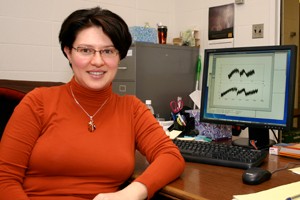
UC Chemist Receives NSF CAREER Award
Ruxandra Dima has been climbing the research ladder since her arrival at the University of Cincinnati in 2006, but the latest rung shes cleared has by far been her greatest.
The assistant professor of chemistry was recently told that she received the National Science Foundations CAREER Award, one of the most esteemed and competitive grants given by the foundation.
Aside from getting a tenure-track position at a major research university, this is the highest accomplishment Ive received, Dima said. Its gratifying to know that something you do is appreciated.
The CAREER Award is given to junior faculty who exemplify the role of teacher-scholars through outstanding research, excellent education and the integration of education and research within the context of the mission of their organizations, according to NSFs Web site.
The five-year, $611,521 grant was awarded to Dima from the NSF directorate for biological sciences for her proposal on Multiscale investigations of micromechanics of cytoskeletal protofilaments.
Dimas research in biophysical chemistry looks at filaments in the cell, such as actin and microtubules, and how their mechanical properties are affected by forces in the cell.
Tension applied to cells during cell-cell or cell-extracellular matrix attachment leads to the deformation of cells and induces changes in protein synthesis and channel activation, Dima explained. Cytoskeletal filaments such as actin and microtubules mediate the action of force through their mechanical properties and extensive communications with cellular co-factors.
The goal of our research is to elucidate the effect of forces on the internal organization of the filaments and its connection with the large-scale mechanical behavior of filaments.
While her research focuses explicitly on the behavior of these filaments, what she finds may affect not just how we look at the cells mechanisms, but how we can alter them to prevent or treat diseases.
One of the main cytoskeletal filaments, microtubules, is involved in the process of mitosis. If this specific filament doesnt function properly in a cell, mitosis cannot occur. By learning the details of the large-scale behavior, then, scientists may ultimately be able to block mitosis, thus preventing bad cells (such as cancer cells) from forming or spreading.
The problem at present, though, is that nobody understands exactly how this process takes place, she said.
With funding for her research on the topic, shell help bring the scientific community one step closer to learning that process.
The CAREER Award doesnt just fund scientists for their research, however. A large component of the grant involves education and outreach, an aspect Dima is passionate about. She participates with UC's Girls in Science, an outreach program led by physics Professor Margaret Hanson, which aims to keep girls in fourth through sixth grades interested in science and promising science careers for women. Other contributions include the Women in Science and Engineering (WISE) program, which helps undergraduates at the university get involved with scientific research as well.
Now Dima is considered in good company with others in the chemistry department, as a handful of others have also received the NSF CAREER Award in recent years.
Its great that Ruxandra received that recognition, said Patrick Limbach, chemistry department head and professor. In our department, we certainly anticipate our young faculty to have the qualities to receive the award, so I wouldnt say it was surprising that she won. But it was certainly well deserved.
Dima received her undergraduate degree from the University of Bucharest, Romania and obtained her PhD from Pennsylvania State University in 1999. Prior to her arrival at University of Cincinnati, she worked at the Institute for Physical Science and Technology at the University of Maryland and the University of Massachusetts, Lowell.
Related Stories
From Punchline to Pride: An Ohio class on the history of Queer
January 16, 2025
In an interview with The Buckeye Flame, a publication that amplifies the voices of LGBTQ+ Ohioans to support community and civic empowerment, UC adjunct professor Nicholas Belperio describes the impact of a class he teaches titled “Queer TV.”
WDET: Potential U.S. TikTok ban weighs national security against...
January 16, 2025
UC cybersecurity expert Dr. Richard Harknett discusses a TikTok ban with Detroit public radio. The U.S. Supreme Court is weighing whether a law passed by Congress and signed by President Joe Biden is constitutional.
Mosquitoes can be extra-bitey in droughts
January 15, 2025
UC biologists found that mosquitoes survive prolonged droughts by drinking blood, which explains how their populations rebound so quickly when it finally rains.
